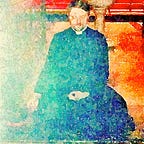Today, the Church remembers St. Matthias, Apostle.
Ora pro nobis.
Matthias (died c. 80 AD) was, according to the Acts of the Apostles, the apostle chosen to replace Judas Iscariot following Judas’ betrayal of Jesus and his (Judas’) subsequent death. His calling as an apostle is unique, in that his appointment was not made personally by Jesus, who had already ascended into heaven, and it was also made before the descent of the Holy Spirit upon the early Church.
There is no mention of a Matthias among the lists of disciples or followers of Jesus in the three synoptic gospels, but according to Acts, he had been with Jesus from his baptism by John until his Ascension. In the days following, Peter proposed that the assembled disciples, who numbered about one hundred-twenty, nominate two men to replace Judas. They chose Joseph called Barsabas (whose surname was Justus) and Matthias. Then they prayed, “Thou, Lord, which knowest the hearts of all [men], shew whether of these two thou hast chosen, That he may take part of this ministry and apostleship, from which Judas by transgression fell, that he might go to his own place.”[Acts 1:24 — 25] Then they cast lots, and the lot fell to Matthias; so he was numbered with the eleven apostles.
No further information about Matthias is to be found in the canonical New Testament. Even his name is variable: the Syriac version of Eusebius calls him throughout not Matthias but “Tolmai”, not to be confused with Bartholomew (which means Son of Tolmai), who was one of the twelve original Apostles; Clement of Alexandria refers once to Zacchaeus in a way which could be read as suggesting that some identified him with Matthias; the Clementine Recognitions identify him with Barnabas; Hilgenfeld thinks he is the same as Nathanael in the Gospel of John.
The tradition of the Greeks says that St. Matthias planted the faith about Cappadocia and on the coasts of the Caspian Sea, residing chiefly near the port Issus. According to Nicephorus (Historia eccl., 2, 40), Matthias first preached the Gospel in Judaea, then in Aethiopia (by the region of Colchis, now in modern-day Georgia) and was there stoned to death.
An extant Coptic Acts of Andrew and Matthias, places his activity similarly in “the city of the cannibals” in Aethiopia. A marker placed in the ruins of the Roman fortress at Gonio (Apsaros) in the modern Georgian region of Adjara claims that Matthias is buried at that site.
The Synopsis of Dorotheus contains this tradition: “Matthias preached the Gospel to barbarians and meat-eaters in the interior of Ethiopia, where the sea harbor of Hyssus is, at the mouth of the river Phasis. He died at Sebastopolis, and was buried there, near the Temple of the Sun.”
Alternatively, another tradition maintains that Matthias was stoned at Jerusalem by the Judeans, and then beheaded. According to Hippolytus of Rome, Matthias died of old age in Jerusalem.
Clement of Alexandria observed (Stromateis vi.13.):
“Not that they became apostles through being chosen for some distinguished peculiarity of nature, since also Judas was chosen along with them. But they were capable of becoming apostles on being chosen by Him who foresees even ultimate issues. Matthias, accordingly, who was not chosen along with them, on showing himself worthy of becoming an apostle, is substituted for Judas.”
Almighty God, who in the place of Judas chose your faithful servant Matthias to be numbered among the Twelve: Grant that your Church, being delivered from false apostles, may always be guided and governed by faithful and true pastors; through Jesus Christ our Lord, who lives and reigns with you, in the unity of the Holy Spirit, one God, now and for ever.
Amen.
